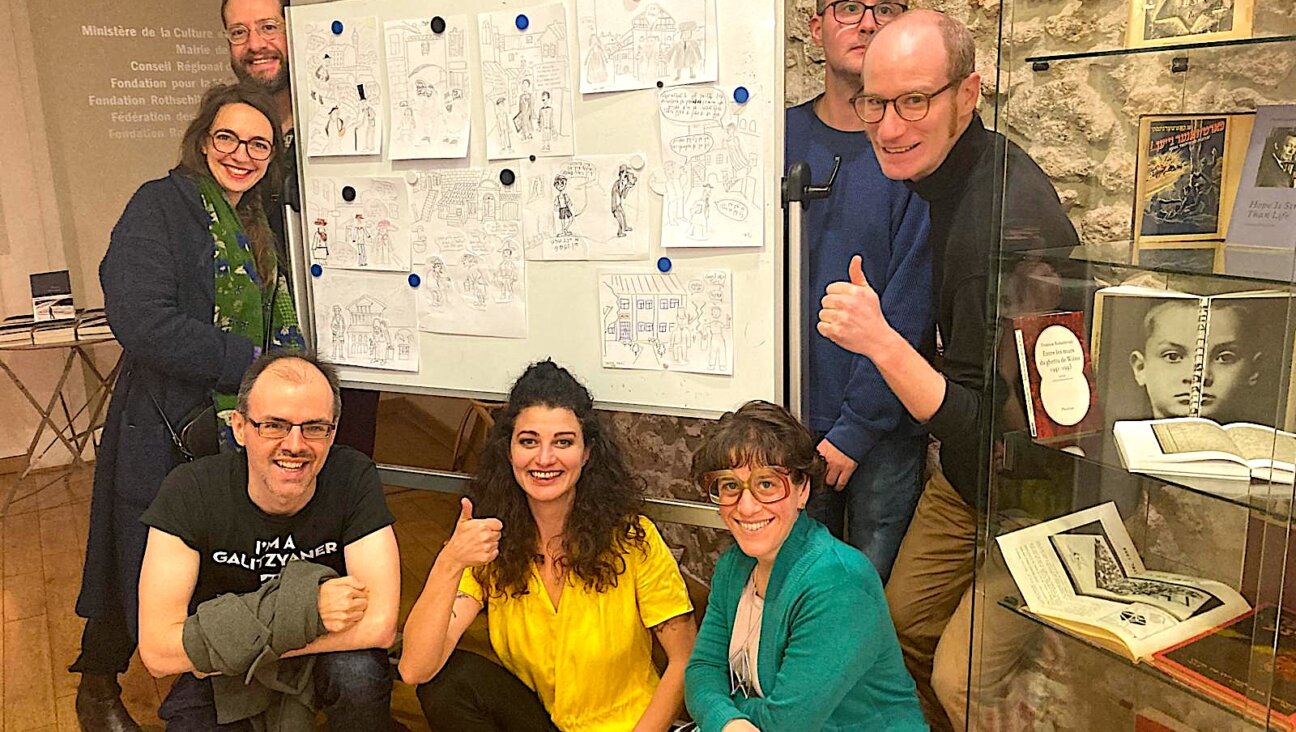Refugees Facing End of Federal Aid As Deadline for Citizenship Looms
CHICAGO — As her husband Iosif explains their dire situation in broken English, 70-year-old Polina Kats sits on the couch in her small Chicago apartment, rubbing her hands while staring out the window with her brows furrowed anxiously.
Since they arrived from Latvia as Jewish refugees almost seven years ago, the Katses have known that they needed to get their citizenship papers within seven years.
They have tried to meet that deadline, as the piles of certified letters and applications on their kitchen table attest. But they still are not even close, and when their allotted time runs out in July, the government, as promised, will cut them off of Supplemental Security Income, which provides them with the $846 a month that pays for their rent and food.
Because of a little-noticed clause in the 1996 welfare reform law, immigrants let into the United States after 1996 for humanitarian reasons have seven years to get their U.S. citizenship before losing SSI benefits. Jewish refugees from Iran and the former Soviet Union form a large block of these immigrants, but Iraqi Kurds, Cubans and Somali Bantus, among others, also are also affected.
For Iosif and Polina, the SSI check is their only source of income. Their caseworker from the Hebrew Immigrant Aid Society of Chicago, Lyudmila Smotkina, who acted as translator for this article, refused to ask the couple what they will do after the July deadline.
“That is a question that can only hurt them,” she said, offended. “I think it’s quite clear what the situation will be.”
The Bush administration appears to have recognized the problem with the time limit. In the 2005 budget that the president proposed last month, the administration allocated money for a one-year extension of SSI benefits for immigrants who are reaching the seven-year limit. But this will not help those, like the Katses, who will have lost their benefits before the proposed budget takes effect next October. It will also provide only a temporary reprieve for the many immigrants who take longer than eight years to make it through the system.
Since September 11, the difficulties on the road toward citizenship have intensified. The wait time for green cards has almost doubled and immigrant advocates say the U.S. Citizenship and Immigration Services has become less customer-friendly than ever. No one is feeling these difficulties more than the refugees being cut off from government assistance.
The first casualties of the SSI restrictions have appeared only in the past few months, since the seven-year anniversary of welfare reform.
The Social Security Administration estimates that by last September 1,200 immigrants had lost benefits. During 2004, another 8,317 will face the end of their allotted seven years.
The time limit on SSI was only one element of the 1996 welfare reforms that attempted to reduce the number of non citizens receiving government benefits. But immigrant advocates say this particular restriction falls on the last group that should bear the burden of cost-saving measures — the elderly and disabled who are eligible for SSI.
“When we brought these people in as refugees, we knew they were unable to work and we promised them support,” said Pam Seubert, vice president of the Jewish Federation of Metropolitan Chicago, who has been one of the leaders in a strong Chicago contingent pushing for legislative change. “It’s immoral to wait seven years and then cut them off at a point when they clearly cannot go home. And for something that is not their fault.”
The lack of an American passport after seven years, refugee advocates say, is rarely for a lack of effort. In the case of the Katses, within a few months of arriving in Chicago they had applied for green cards — the first step toward becoming a citizen.
Polina moved through the process, but she hit a snag with the expiration date of her fingerprints and now she has little chance of making it before July. Right now she is waiting for another fingerprint appointment. Once she gets this and schedules an interview, she will still have to pass the security check, which is said to be the most unpredictable stage in the process.
But Polina is in good shape next to Iosif. He applied for a green card at the same time — now almost seven years ago — and still does not have one. Three and a half years after first applying, he received a letter from the Immigration and Naturalization Service informing him that his papers had been lost, and he would have to re-apply. He immediately did, paying the $240 application fee again, but whereas the first time he applied the INS estimated a wait time of 245 days for a green card, the second time the estimated wait had increased to 450 days. Iosif has sent four certified letters inquiring about his status, but has not heard back. Without a green card, he is at least two years away from citizenship.
The Katses’ struggle with the citizenship process is not unique among the humanitarian immigrants losing benefits. There are a number of reasons that elderly and disabled refugees frequently take much longer than the seven years. For many, the English-language test that is part of the interview proves an insurmountable hurdle.
A more substantial roadblock for those who come in as political asylees — a growing number, as the refugee program has shrunk since September 11 — is the yearly cap of 10,000 on the number of asylees who can receive green cards. Right now asylees wait an average of 15 to 20 years for their green cards.
The Chicago office of the Hebrew Immigrant Aid Society, which helped the Katses to settle here, has an aggressive outreach program to help immigrants move through the process more quickly. HIAS caseworkers also prod citizenship authorities when applications get stuck. But Susanne Franklin, the administrator for HIAS Chicago, said that there are “black holes” in the process, like the security check, where “we hit a brick wall, and there’s nothing we can do to help” — a barrier that has grown particularly intractable since September 11.
With all the problems they have faced, the Katses are still lucky to be in Chicago. Illinois is one of the few states where SSI benefits are not linked to Medicaid. In 37 other states, when refugees lose their SSI benefits, they also lose their health insurance.
Because of these ramifications, refugee advocates have been scrambling to get SSI benefits uncoupled from citizenship, but aside from the one-year extension in the 2005 budget, there does not appear to be any governmental solution on the horizon. The Social Security Administration has made it clear that it cannot alter the rules in the short term.
“We are very concerned with the public that we serve,” said Mark Lassiter, a spokesman for the Social Security Administration. “But clearly it’s not within our purview to not administer the laws as they are.”
Some of those being cut off have younger family members here to help them. In Chicago, the Jewish Family and Children’s Services has stepped in to provide some cash assistance for the 12 or so HIAS Chicago clients who have been cut off. But that is only a short-term solution for a select few, advocates say.
“Most of these people can’t go to work and are here alone with SSI as their only form of cash support,” said Kate Hilton-Hayward, senior program officer at the Immigration and Refugee Services of America.
The Katses seem committed to making as much as possible of the life they have built for themselves in their small corner of America. They go to synagogue each weekend, a privilege they never had in the Soviet Union. In their small apartment on the 24th floor of a low-income apartment building, their wall-length window provides a stunning panoramic view of the lake and downtown Chicago. When it is warm enough, Polina walks down to the lake, where she has befriended a 92-year-old Chinese man who guides her in meditation.
But all of this becomes less comforting as the calendar hastens toward July. Their caseworker says the Katses send letters and make calls almost daily to their congresswoman or the Citizenship and Immigration Service, hoping for some way of expediting their citizenship case. They still do not fully believe the SSI checks may really end.
“It is not possible that they will really cut us off.” Iosif says with uncertainty. “It was not our fault.”
A message from our CEO & publisher Rachel Fishman Feddersen

I hope you appreciated this article. Before you go, I’d like to ask you to please support the Forward’s award-winning, nonprofit journalism during this critical time.
We’ve set a goal to raise $260,000 by December 31. That’s an ambitious goal, but one that will give us the resources we need to invest in the high quality news, opinion, analysis and cultural coverage that isn’t available anywhere else.
If you feel inspired to make an impact, now is the time to give something back. Join us as a member at your most generous level.
— Rachel Fishman Feddersen, Publisher and CEO






















